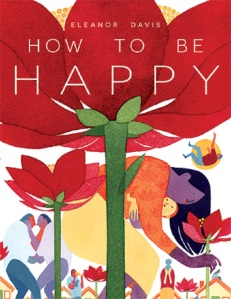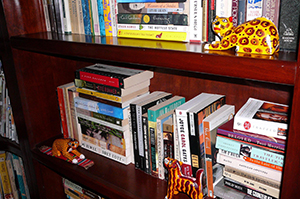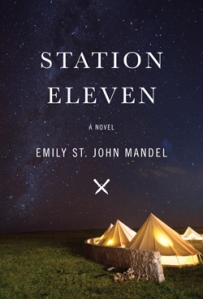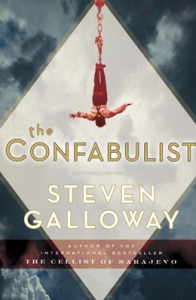 This year’s book choosing evening was different from any of our previous reading plan meetings. For one, this year the meeting was moved to May, instead of our usual April night. But the biggest reason it was different was because our dear friend Trish was not there. At least, she was not there in the physical sense, but she was certainly with us in spirit. Our meeting was wonderful, there was chatting, sharing, remembering, we got our work done (9 books chosen – 1 pending) — but, we missed Trish. We all felt her absence with a deep ache in our hearts.
This year’s book choosing evening was different from any of our previous reading plan meetings. For one, this year the meeting was moved to May, instead of our usual April night. But the biggest reason it was different was because our dear friend Trish was not there. At least, she was not there in the physical sense, but she was certainly with us in spirit. Our meeting was wonderful, there was chatting, sharing, remembering, we got our work done (9 books chosen – 1 pending) — but, we missed Trish. We all felt her absence with a deep ache in our hearts.
Book choosing is an important time for us Novel Thinkers. We devote an entire meeting to picking our reading selections for the whole year. We look forward to this event, we all love reading and we can’t wait to get together and determine our choices.
We usually have a great list of 10 books to read and discuss every year. Once in a while our book list is humdrum, but that is rare — our book choices usually get us excited and exploring ideas about the book and related topics and beyond. Oh, I’m not saying that every book is a winner, we’ve certainly had a few bombs, but we’ve never had a year’s worth of fails.
This year, I think we have outdone ourselves. Not that I think we will love every title on our new list, or that every one of these books will generate a storm of conversation. But I do believe that we may have stepped right out of our reading comfort zone with some of our picks!
I’m excited for this years’ readings — it will be very interesting to see what we feel, think, love/hate about our choices. Take a look below for a synopsis of our Book List for 2016/2017. Tell us what you think. Have you read any of these titles??
Novel Thinkers’ 2016/2017 Book List
June* — A Tale for the Time Being by Ruth Ozeki
Shortlisted for the 2013 Man Booker Prize
In Tokyo, sixteen-year-old Nao has decided there’s only one escape from her aching loneliness and her classmates’ bullying. But before she ends it all, Nao first plans to document the life of her great grandmother, a Buddhist nun who’s lived more than a century. A diary is Nao’s only solace — and will touch lives in ways she can scarcely imagine.
Across the Pacific, we meet Ruth, a novelist living on a remote island who discovers a collection of artifacts washed ashore in a Hello Kitty lunchbox —possibly debris from the devastating 2011 tsunami. As the mystery of its contents unfolds, Ruth is pulled into the past, into Nao’s drama and her unknown fate, and forward into her own future.
— From Ruth Ozeki’s website
*Please Note: I have been a little lax in writing this post — we have already read and discussed June’s selection. I wasn’t at the meeting, so I cannot comment on the group’s feelings about “A Tale For the Time Being” — but I can say that I loved it.
~~~~~~~~~~~~~~
July – A Great Deliverance by Elizabeth George
In A Great Deliverance, Elizabeth George probes the delicate motivations of the heart against a backdrop of buried scandals, unresolved antagonisms and dizzying ambiguities. It was her debut novel, the winner of the Agatha and Anthony Awards for best first novel as well as France’s Grand Prix de Litterature Policiere. It was nominated for both a Macavity and an Edgar. It has been optioned for television by the BBC.
— From Elizabeth George’s website
~~~~~~~~~~~~~~
August – TBD – We are planning to choose a title from Trish’s Book of Books (her list of every book she has read)
~~~~~~~~~~~~~~
September – Martin John by Anakana Schofield
Martin John, the Scotiabank Giller Prize-shortlisted novel by Anakana Schofield, is an extremely creepy tale of a serial sexual predator and what he can get away with. It’s also a heartbreaking portrait of a man on the margins of society, being crushed by the weight of his mental illness.
— From CBC Books
~~~~~~~~~~~~~~
October** – Something Fierce — Memoirs of a Revolutionary Daughter by Carmen Aguirre
Winner of CBC’s Canada Reads 2012
Six-year-old Carmen Aguirre fled to Canada with her family following General Augusto Pinochet’s violent 1973 coup in Chile. Five years later, when her mother and stepfather returned to South America as members of the Chilean resistance, Carmen and her younger sister went with them, quickly assuming double lives of their own. At just eighteen years old, Carmen became a militant herself, plunging further into a world of paranoia, terror, and euphoria.
Something Fierce takes the reader inside war-ridden Peru, dictator-ruled Bolivia, post-Malvinas Argentina and Pinochet’s Chile in the eventful decade between 1979 and 1989, at the same time showing the beauty of these nations and the resilience of their people. Dramatic, suspenseful and darkly comic, it is a rare first-hand account of revolutionary life and a passionate argument against forgetting.
— From Carmen Aquirre’s website
**Author Visit: This book discussion will be even more memorable because Carmen Aguirre has graciously agreed to join us for the evening. We are excitedly looking forward to her visit!
~~~~~~~~~~~~~~
November – All the King’s Men by Robert Penn Warren
Winner of the 1947 Pulitzer Prize
No. 67 on the Robert McCrum 100 Best Novels of all Time (2003)
All the King’s Men is one of American literature’s definitive political novels, as well as a profound study of human fallibility in politics. Set in the 1930s, it describes the dramatic rise to power, as state governor, of Willie Stark, a one-time radical attorney.
— From The Guardian review
This novel was made into a movie in 1949 starring Broderick Crawford, John Ireland, & Joanne Dru and a remake in 2006 starring Sean Penn, Jude Law, & Kate Winslet
~~~~~~~~~~~~~~
December – Book Club potluck. No Book
~~~~~~~~~~~~~~
January – Seveneves by Neal Stephenson
Winner of the 2016 Hugo Award
A catastrophic event renders the earth a ticking time bomb. In a feverish race against the inevitable, nations around the globe band together to devise an ambitious plan to ensure the survival of humanity far beyond our atmosphere, in outer space.
But the complexities and unpredictability of human nature coupled with unforeseen challenges and dangers threaten the intrepid pioneers, until only a handful of survivors remains . . . Five thousand years later, their progeny—seven distinct races now three billion strong—embark on yet another audacious journey into the unknown . . . to an alien world utterly transformed by cataclysm and time: Earth.
— From Harper Collins
~~~~~~~~~~~~~~
February – A Man called Ove by Fredrik Backman
Meet Ove. He’s a curmudgeon—the kind of man who points at people he dislikes as if they were burglars caught outside his bedroom window. He has staunch principles, strict routines, and a short fuse. People call him “the bitter neighbor from hell.” But must Ove be bitter just because he doesn’t walk around with a smile plastered to his face all the time?
Behind the cranky exterior there is a story and a sadness. So when one November morning a chatty young couple with two chatty young daughters move in next door and accidentally flatten Ove’s mailbox, it is the lead-in to a comical and heartwarming tale of unkempt cats, unexpected friendship, and the ancient art of backing up a U-Haul. All of which will change one cranky old man and a local residents’ association to their very foundations.
— From Simon and Schuster
~~~~~~~~~~~~~~
March – I Let You Go by Clare Mackintosh
In a split second, Jenna Gray’s world is shattered. Her only hope of moving on is to walk away from everything she knows to start afresh. Desperate to escape her past, Jenna moves to a remote cottage on the Welsh coast, but she is haunted by her fears, her grief and her memories of the cruel November night that changed her life for ever.
DI Ray Stevens is tasked with seeking justice for a mother who is living every parent’s worst nightmare. Determined to get to the bottom of the case, it begins to consume him as he puts both his professional and personal life on the line.
— From Clare Mackintosh’s website
~~~~~~~~~~~~~~
Next Book Club: July 25, 2016
Book: A Great Deliverance by Elizabeth George
Place: Judi
Snack: Shauna
Save
Save
Save
Save
Save
 The illustrations in How to Be Happy are amazing — the bold colours, the gorgeous linework — every page* is a delight to behold. I feel that the movement and emotion of Davis’ artwork is the best part of this book.
The illustrations in How to Be Happy are amazing — the bold colours, the gorgeous linework — every page* is a delight to behold. I feel that the movement and emotion of Davis’ artwork is the best part of this book.
 This year’s book choosing evening was different from any of our previous reading plan meetings. For one, this year the meeting was moved to May, instead of our usual April night. But the biggest reason it was different was because our dear friend Trish was not there. At least, she was not there in the physical sense, but she was certainly with us in spirit. Our meeting was wonderful, there was chatting, sharing, remembering, we got our work done (9 books chosen – 1 pending) — but, we missed Trish. We all felt her absence with a deep ache in our hearts.
This year’s book choosing evening was different from any of our previous reading plan meetings. For one, this year the meeting was moved to May, instead of our usual April night. But the biggest reason it was different was because our dear friend Trish was not there. At least, she was not there in the physical sense, but she was certainly with us in spirit. Our meeting was wonderful, there was chatting, sharing, remembering, we got our work done (9 books chosen – 1 pending) — but, we missed Trish. We all felt her absence with a deep ache in our hearts. This coming Monday is our book choosing meeting! We normally hold this meeting in April, but we postponed it for a month so that we could gather together to reminisce, grieve, laugh and cry — and support each other in our loss.
This coming Monday is our book choosing meeting! We normally hold this meeting in April, but we postponed it for a month so that we could gather together to reminisce, grieve, laugh and cry — and support each other in our loss.
